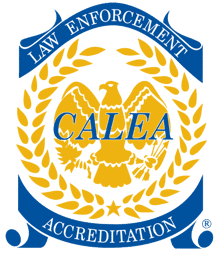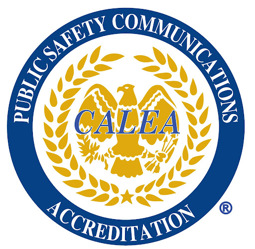In November 2021, our Sheriff's Office and Detention Center began the long and detailed process towards becoming accredited agencies through two nationally renowned accreditation organizations: CALEA and NIJO.
Accreditation begins with a 2-3 year initial assessment, wherein we compare our operations to the standards set forth by CALEA and NIJO and adjust our policies and procedures accordingly. When we believe we are in compliance with all standards, the accreditation company sends assessors to evaluate our agency. Finding us well-equipped and in compliance, they award us our accreditation certificates.
But it doesn't stop after the initial assessment; accreditation is an ongoing process that requires re-inspection by CALEA and NIJO assessors every four years. During the in-between years, audits and inspections are continually conducted to ensure the Clay County Sheriff’s Office and Detention Center is maintaining their prestigious status of being accredited.

On March 6, 2024, NIJO awarded the Clay County Detention Center a Level I Accreditation.
The National Institute for Jail Operations (NIJO) was formed in 2011 as the primary resource dedicated to serve those that operate jails, detention and correctional facilities. Recognizing the enormous liability and increasing litigation facing administrators, NIJO provides a compilation of legal-based resources and information for agencies to make facilities safer and more secure, proactively defend against frivolous litigation, and protect against adverse publicity and liability.
Because accreditation guidelines are based on case law, the requirements of the accreditation process are consistent among all jails, regardless of size and structure.
These are the most cited benefits of those agencies seeking NIJO Accreditation:
- Discover dysfunction, misconduct and noncompliance before it results in litigation, embarrassment or other harm
- Proactively defend against lawsuits by measuring current policies and practices to what is required by the law
- Justify requests for additional funding
- Improve staff training, development and professionalism
- Create safer environment for staff and offenders
- Reduce liability insurance costs
For more information on NIJO visit their website at www.jailtraining.org

The Commission on Accreditation for Law Enforcement Agencies, Inc. (CALEA®), was created in 1979 as a credentialing authority through the joint efforts of law enforcement’s major executive associations. The CALEA Accreditation program seals are reserved for use by those public safety agencies that have demonstrated compliance with CALEA Standards and have been awarded CALEA Accreditation by the Commission.
The purpose of CALEA’s program is to make sure our policies are well-suited and followed correctly, providing safety and security not only for our own personnel, but also for any persons who come in contact with our agency or deputies.
Specifically, CALEA’s goals are to:
- Strengthen crime prevention and control capabilities;
- Formalize essential management procedures;
- Establish fair and nondiscriminatory personnel practices;
- Improve service delivery;
- Solidify inter-agency cooperation and coordination; and
- Increase community and staff confidence in the agency.
For more information on CALEA visit their website at www.calea.org

On March 22, 2025, CALEA awarded the Clay County Sheriff's Office with a certificate of accreditation for law enforcement.
The Law Enforcement Accreditation process focuses on standards that provide best practices related to life, health, and safety procedures for the agency. These standards are considered foundational for contemporary law enforcement agencies.
The program provides the framework for addressing high risk issues within a contemporary environment, and ensures officers are prepared to meet basic community service expectations and prepared to manage critical events.

The agency began progress towards Communications accreditation in October 2024.
The Public Safety Communications Accreditation Program provides a communications center, or the communications unit of a public safety agency, with a process to systemically review and internally assess its operations and procedures.
This program requires organizations to collect and analyze important data for the purpose of making sound operational and administrative business decisions, creating leadership and practitioner-accountability.
In addition, the focus is on quality assurance, interoperability, emerging technologies, risk analysis, asset security, resources access, contemporary training, and a range of other operational functions.
Accreditation Team
These are the members working hard behind the scenes:
Mabel McIntosh, Accreditation Manager
Amber Brumley, Accreditation Specialist
Tracy Wade, Detention Administrative Lieutenant
Phil Coffer, Administration Bureau Major
Kim Hunter, Communications Supervisor, CIRT K9 Handler - K9 Lola
For questions, please contact Accreditation Manager McIntosh at 816-407-3754.

